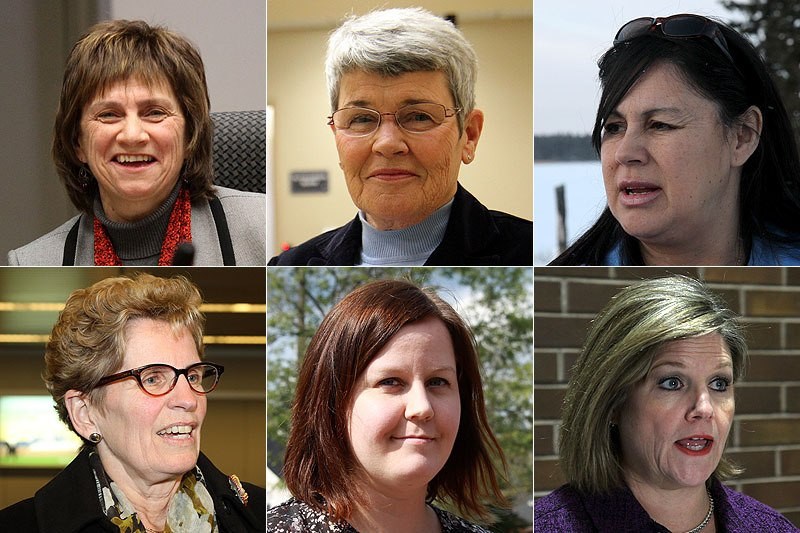Despite having six female premiers across Canada, many women involved in politics say they’re still inside a man’s world.
Kathleen Wynne was elected as the leader of the Ontario Liberal party in January and became the province’s first female premier and the sixth in the country. The other premiers include Eva Aariak in Nunavut, Kathy Dunderdale in Newfoundland and Labrador, Alison Redford in Alberta, Christy Clark in British Columbia and Pauline Marois in Quebec.
Wynne told national media that she agreed her win was a breakthrough for women in politics.
But women still only represent about 30 per cent of Canadian politicians across all levels of government. In Ontario, female MPPs makeup 30 per cent of the legislature.
Sarah Campbell (NDP, Kenora- Rainy River) is among the 30 percent at Queen’s Park.
Politics wasn’t something Campbell intentionally pursued. She suspected the spark came from spending time with her grandparents who liked to talk about politics. She became more involved in high school and took political science in school.
Campbell agrees that there’ is a perception that men dominate politics but she says it isn’t the case.
Seeing six women premiers is more a reflection of the times, she says gender isn’t as much of an issue as it once was. She believes people are more willing to listen to someone based on their merit rather than if they wear pants or a skirt.
Despite that, Campbell admits there are times when she’s expected to act in a certain way just because she’s a woman. Campbell says that if she acts passionately about a topic then she’s perceived as overly aggressive.
“There’s still some remnants of the old boys club,” she says. ”I’ve run into a few leaders who have expected me to take orders but those people are becoming fewer and fewer. I also think it is the nature of politics.
“Your opponents will try to unnerve you by any means possible. If it wasn’t the fact I’m a woman then it would be my age, race or background.”
Although women’s presence is increasing in politics, Campbell says women still face a number of challenges.
The NDP MPP says women do not want to get involved in the mudslinging as much as men.
Ontario NDP leader Andrea Horwath says it’s concerning that women only make up 30 per cent of the electorate across Canada.
There’s a number of challenges for women getting into politics but Horwath agreed with Campbell that one of the main obstacles is the perception that the career is a blood sport.
”People talk about (politics) as being shark infested waters,” she says. “Those kinds of descriptions turn women off from the get go because politics can be very cut and thrust. Lots of times when women think of how they can contribute best, they’re much more collaborative, they’re problem solvers and they multitask.”
“Another barrier is women believe there’s a way of doing things in politics that isn’t familiar to them and it’s a place they don’t feel comfortable,” she says.
At-Large Coun. Rebecca Johnson is one of two women councillors in Thunder Bay. Her only female counterpart in council chambers is Neebing Coun. Linda Rydholm.
Johnson says it takes a big commitment to be an elected official and it’s tough to balance family responsibilities. But she believes it is especially hard for women.
“Women make up 51 per cent of the population and they should be represented at all tables,” Johnson says. “I ask women ’are you going to run?’ If I step out who is going to take over?’ Right now, we only have two women on our council. I’m very concerned about that.
“I’m really working on getting women at the council table.”
Johnson adds that she’s looking at hosting a forum for women with the president of Lakehead University Brian Stevenson’s wife, Judy Stevenson.
The forum would take place sometime in the late spring or in the fall.
Although it is a challenge to enter into the world of policies, Johnson says women have the ability but there’s a lot of work involved.
“It’s a challenge,” she says. “It’s still dominated by men. I don’t know when you ever finish being a woman suffragist. There are those barriers like it or not. To enhance the opportunity for women to come forward, some of those things have to be looked at.”
Patrick Cain, a political science professor at Lakehead University, says a persistence of successful women has already been set long before Wynne. He used Lyn McLeod, who became the leader of the Ontario Liberal party, as a local example.
Cain argues that many people have paved the way for Wynne and her success in turn will do the same for other women later down the road.
Cain says part of the reason why women only make up 30 per cent is because they have only been a part of the general workforce for the past two or three generations. He says there’s some catch that needs to happen.
“It often takes one step at a time,” Cain says. “Historically speaking, there’s a general trend toward more females in positions of significant political power. I expect that to continue for the most part in the foreseeable future.”
Some national media have speculated that Wynne will become an scapegoat similar to what happened with former prime minister Kim Campbell.
Cain disagrees.
He says that the comparison to Campbell isn’t a good one because he believes the Liberals chose Wynne to lead the party out of its hardships.
“What happened to Kim Campbell destroyed the whole Progressive Conservative party,” he adds. “
“Kim Campbell was a dismal failure as a party leader and I think the Liberals are hoping that Wynne will be a success.”
